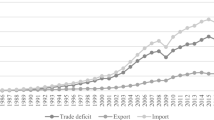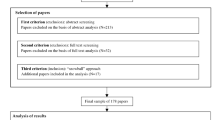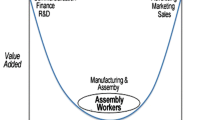Abstract
The 2013 collapse of the Rana Plaza building in Dhaka, Bangladesh, led external stakeholders to insist on higher labor standards in apparel global value chains (GVCs). Stakeholders now expect MNEs to take ‘full-chain’ responsibility. However, the increased monitoring and enforcement costs of a large network of suppliers have been non-trivial. MNEs instead implement a ‘cascading compliance’ approach, coupled with a partial re-internalization. Elevated costs are further exacerbated in developing countries where the informal and formal sectors are linked, and cost competitiveness greatly depends on this duality. Monitoring actors in the informal sector is difficult, and few informal actors can achieve compliance. GVCs have therefore reduced informal sector engagement by excluding non-compliant actors and investing in greater automation. By seeking to strictly enforce compliance, MNEs are attenuating some of the positive effects of MNE investment, particularly the prospects for employment creation (especially among women), and enterprise growth in the informal sector. I discuss how these observations might inform other cross-disciplinary work in development, ethics, and sociology. Finally, I note implications for IB theory from the disparities between the ownership, control, and responsibility boundaries of the firm.
Resume
La catastrophe de Rana Plaza en 2013 a amené les parties prenantes externes à insister sur des normes du travail plus strictes dans les chaînes de valeur mondiales (CVM) du vêtement. Les parties prenantes s’attendent maintenant à ce que les EMN assument la responsabilité de la «chaîne complète». Cependant, les coûts accrus de surveillance et d’application d’un grand réseau de fournisseurs ont été non négligeables. Les EMN appliquent plutôt une approche de «conformité en cascade», associée à une ré-internalisation partielle. Les coûts élevés sont encore exacerbés dans les pays en développement où les secteurs informel et formel sont liés, et où la compétitivité des coûts dépend fortement de cette dualité. Il est difficile de surveiller les acteurs du secteur informel et peu d’acteurs informels peuvent s’y conformer. Les CVM ont donc réduit l’engagement du secteur informel en excluant les acteurs non conformes et en investissant dans une plus grande automatisation. En cherchant à appliquer strictement la conformité, les EMN atténuent certains des effets positifs de leurs investissements, en particulier les perspectives de création d’emplois (en particulier chez les femmes) et de croissance des entreprises dans le secteur informel. Je discute comment ces observations pourraient éclairer d’autres travaux interdisciplinaires sur le développement, l’éthique et la sociologie. Enfin, j’explique les implications des disparités entre les limites de propriété, de contrôle et de responsabilité de la firme pour la théorie en IB.
Resumen
El desastre del 2013 en Rana Plaza llevó a los grupos de interés externos a insistir en estándares laborales más altos en las cadenas globales de valor (CGV) de ropa. Los grupos de interés ahora esperan que las EMN asuman responsabilidad por “toda la cadena”. Sin embargo, los costos cada vez mayor del monitoreo y de hacer cumplir las normas de una gran red de proveedores no ha sido trivial. Las EMN en su lugar implementan un enfoque de “conformidad en cascada” junto con una re-internalización parcial. Los costos elevados se agravan aún más en países en desarrollo donde los sectores informal y formal están ligados, y la competitividad de los costos depende en gran medida de esta dualidad. El monitoreo de los actores en el sector informal es difícil, y pocos actores informales pueden lograr el cumplimiento. Por consiguiente, las CGV han reducido la participación informal al excluir los actores que no cumplen e invertir en una mayor automatización. Buscando hacer cumplir estrictamente el cumplimiento, las EMN están atenuando algunos de los aspectos positivos de la inversión de las EMN, en particular las posibilidades de generación de empleos (especialmente para las mujeres), y para el crecimiento de las empresas en el sector informal. Discuto cómo estas observaciones podrían informar otros trabajos interdisciplinarios en desarrollo, ética y sociología. Finalmente, observo las implicaciones para la teoría de negocios internacionales desde las disparidades entre la propiedad, el control y la frontera de las responsabilidades de la empresa.
Resumo
O desastre de 2013 no Rana Plaza levou stakeholders externos a insistirem em padrões de trabalho mais elevados nas cadeias globais de valor do vestuário (GVCs). Stakeholders esperam agora que MNEs assumam responsabilidade sobre “toda a cadeia”. No entanto, o aumento dos custos de monitoramento e execução de uma grande rede de fornecedores não tem sido trivial. Em vez disso, MNEs implementam uma abordagem de “conformidade em cascata”, juntamente com uma re-internalização parcial. Custos elevados são ainda mais exacerbados nos países em desenvolvimento, onde os setores informal e formal estão ligados, e a competitividade em termos de custo depende grandemente dessa dualidade. Monitoramento de atores no setor informal é difícil, e poucos atores informais podem alcançar conformidade. CGVs reduziram, portanto, o envolvimento do setor informal, excluindo atores com não-conformidades e investindo em maior automação. Ao buscar o cumprimento rigoroso de conformidades, MNEs estão atenuando alguns dos efeitos positivos do investimento de MNEs, particularmente as perspectivas de criação de emprego (especialmente entre as mulheres) e o crescimento de empresas no setor informal. Discuto como essas observações podem informar outros trabalhos interdisciplinares em desenvolvimento, ética e sociologia. Finalmente, observo implicações para a teoria em IB a partir das disparidades entre os limites de propriedade, controle e responsabilidade da empresa.
摘要
2013年的热尔纳大厦(Rana Plaza)灾难导致外部利益相关者坚持服装全球价值链(GVCs)有更高的劳工标准。利益相关者现在期待跨国公司承担“全链”责任。然而, 大型供应商网络的监控和执法成本的增加并非小事。相反, 跨国公司实施“级联合规”的做法, 加上一部分的重新内化。在非正规和正规行业相互联系的发展中国家, 成本上升进一步加剧, 成本竞争力在很大程度上取决于这种二元性。监控非正规行业的行为者是困难的, 很少有非正规行为者能合规。因此, 全球价值链(GVCs)通过排除不合规的行为者以及投资更高的自动化来减少非正规行业的参与。通过寻求严格执法, 跨国公司正在削弱 跨国公司投资的一些积极影响, 特别是创造就业的前景(特别是在妇女中), 以及非正规行业的企业成长。我讨论这些观察如何对发展、伦理以及社会学的其它跨学科的工作能提供指导。最后, 我讨论了公司的所有权、控制和责任边界之间的差距对国际商务(IB)理论的启示。
Similar content being viewed by others

REFERENCES
Alexander, R. 2018. Sustainability in global production networks–Introducing the notion of extended supplier networks. Competition and Change, 22(3): 255–273.
Al-Mataani, R., Wainwright, T., & Demirel, P. 2017. Hidden entrepreneurs: Informal practices within the formal economy. European Management Review, 14(4): 361–376.
Banerjee, A., & Duflo, E. 2007. The economic lives of the poor. Journal of Economic Perspectives, 21(1): 141–168.
Barrientos, S., Gereffi, G., & Rossi, A. 2011. Economic and social upgrading in global production networks: A new paradigm for a changing world. International Labour Review, 150(3–4): 319–340.
Buckley, P. J. 2009. Internalisation thinking: From the multinational enterprise to the global factory. International Business Review, 18(3): 224–235.
Buckley, P., Doh, J., & Benischke, M. 2017. Towards a renaissance in international business research? Big questions, grand challenges, and the future of IB scholarship. Journal of International Business Studies, 48(9): 1045–1064.
Business for Social Responsibility (BSR). 2017. Empowering female workers in the apparel industry. https://www.bsr.org. Accessed 30 June 2018.
Chen, M. 2012. The informal economy: Definitions, theories and policies. In WIEGO working paper: Vol. 1, No. 26, 90141–90144.
Chen, M., & Doane, D. 2008. Informality in South Asia: A review. In Background paper for the Swedish international development cooperation agency (Sida), (Unpublished Working Paper).
Daily Star. 2017. Number of female employees in Bangladesh down by 13.10 percent. December 7.
Daily Star. 2018. Women’s participation in the job market. March 8.
Das, K. 2012. Situating labour in the global production network debate: As if the ‘South’ Mattered. Ahmedabad: Gujarat Institute of Development Research.
Davies, R. B., & Vadlamannati, K. C. 2013. A race to the bottom in labor standards? An empirical investigation. Journal of Development Economics, 103: 1–14.
Egels-Zandén, N. 2017. Responsibility boundaries in global value chains: Supplier audit prioritizations and moral disengagement among Swedish firms. Journal of Business Ethics, 146(3): 515–528.
Fontana, E., & Egels-Zandén, N. 2018. Non Sibi, Sed Omnibus: Influence of supplier collective behaviour on corporate social responsibility in the Bangladeshi Apparel Supply Chain. Journal of Business Ethics. https://doi.org/10.1007/s10551-018-3828-z.
Fransen, L., & Burgoon, B. 2017. Introduction to the Special Issue: Public and private labor standards policy in the global economy. Global Policy, 8: 5–14.
Geertz, C. 1963. Peddlers and princes: Social development and economic change in two Indonesian towns. Chicago: University of Chicago Press.
Gereffi, G. 2014. Global value chains in a post-Washington Consensus world. Review of International Political Economy, 21: 9–37.
Giuliani, E., & Macchi, C. 2014. Multinational corporations’ economic and human rights impacts on developing countries: A review and research agenda. Cambridge Journal of Economics, 38: 479–517.
Giuliani, E., Pietrobelli, C., & Rabellotti, R. 2005. Upgrading in global value chains: Lessons from Latin American clusters. World Development, 33: 549–573.
Godfrey, P. 2011. Toward a theory of the informal economy. The Academy of Management Annals, 5(1): 231–277.
Gollin, D. 2014. The Lewis model: A 60-year retrospective. The Journal of Economic Perspectives, 283: 71–88.
Guha-Khasnobis, B., Kanbur, R., & Ostrom, E. (Eds.). 2006. Linking the formal and informal economy: concepts and policies. Oxford: Oxford University Press.
Günther, I., & Launov, A. 2012. Informal employment in developing countries: Opportunity or last resort? Journal of Development Economics, 97(1): 88–98.
Hemphill, T., & White, G. 2018. Multinational enterprises, employee safety and the socially responsible supply chain: The case of Bangladesh and the apparel industry. Business and Society Review, 123: 489–528.
Hillemann, J., & Verbeke, A. 2015. Efficiency-driven, comparative institutional analysis in international business. Multinational Business Review, 23: 188–199.
Humphrey, J. 2014. Internalisation theory, global value chain theory and sustainability standards. In R. V. Tulder, A. Verbeke, & R. Strange (Eds.), International business and sustainable development. Emerald: Bingley.
ILO. 2013. Bangladesh: Seeking better employment conditions for better socioeconomic outcomes. Geneva: ILO.
ILO. 2018. Women and men in the informal economy: A statistical picture (3rd ed.). Geneva: ILO.
James, P., Miles, L., Croucher, R., & Houssart, M. 2018. Regulating factory safety in the Bangladeshi garment industry. Regulation and Governance. https://doi.org/10.1111/rego.12183.
Jones-Henry, Y. 2018. Is the era of the sweat shop coming to an end? www.fdiintelligence.com/Locations/Asia-Pacific/China/Is-the-era-of-the-sweat-shop-coming-to-an-end. Accessed 19 April 2019.
Kabeer, N. 2016. Women’s economic empowerment and inclusive growth: Labour markets and enterprise development. UK: School of Oriental and African Studies.
Kabeer, N., & Mahmud, S. 2004. Globalization, gender and poverty: Bangladeshi women workers in export and local markets. Journal of International Development, 16: 93–109.
Kannothra, C. G., Manning, S., & Haigh, N. 2018. How hybrids manage growth and social–business tensions in global supply chains: The case of impact sourcing. Journal of Business Ethics, 148(2): 271–290.
Kano, L. 2018. Global value chain governance: A relational perspective. Journal of International Business Studies, 49(6): 684–705.
Kaplinsky, R. 2005. Globalization, poverty and inequality: Between a rock and a hard place. Cambridge: Polity Press.
Kaplinsky, R., & Morris, M. 2001. A Handbook for value chain research. Ottawa and Brighton: IDRC and IDS.
King, A., & Lenox, M. 2000. Industry self-regulation without sanctions: The chemical industry’s responsible care program. Academy of Management Journal, 43: 698–716.
KnowTheChain. 2018. Apparel and footwear benchmark report. https://knowthechain.org/2018-apparel-and-footwear-benchmark. Accessed 15 Dec 2018.
La Porta, R., & Shleifer, A. 2008. The unofficial economy and economic development. In Brookings papers on economic activity, economic studies program: Vol. 39, No. 2(Fall), 275–363. The Brookings Institution, Washington.
Labowitz, S., & Baumann-Pauly, D. 2014. Business as usual is not an option: Supply chains and sourcing after Rana Plaza. Stern Center for Business and Human Rights, http://stern.nyu.edu/sites/default/files/assets/documents/con_047408.pdf. Accessed 30 July 2018.
Labowitz, S., & Baumann-Pauly, D. 2015. Beyond the tip of the iceberg: Bangladesh’s forgotten apparel workers: 1–43. New York: NYU Stern Center for Business and Human Rights.
Lewis, W. A. 1954. Economic development with unlimited supplies of labour. The Manchester School, 22: 139–191.
Liddick, D. 2011. Crimes against nature: Illegal industries and the global environment. Santa Barbara: Praeger.
Locke, R., Rissing, B., & Pal, T. 2013. Complements or substitutes? Private codes, state regulation and the enforcement of labour standards in global supply chains. British Journal of Industrial Relations, 51(3): 519–552.
Lund-Thomsen, P., & Nadvi, K. 2010. Clusters, chains and compliance: Corporate social responsibility and governance in football manufacturing in South Asia. Journal of Business Ethics, 93(2): 201–222.
Maggioni, D., Santangelo, G. D., & Koymen-Ozer, S. 2019. MNEs’ location strategies and labor standards: The role of operating and reputational considerations across industries. Journal of International Business Studies, 50(6): 948–972.
Maksimov, V., Wang, S. L., & Luo, Y. 2017. Reducing poverty in the least developed countries: The role of small and medium enterprises. Journal of World Business, 52(2): 244–257.
McGahan, A. 2012. Challenges of the informal economy for the field of management. Academy of Management Perspectives, 26(3): 12–21.
Mezzadri, A. 2014. Indian garment clusters and CSR norms: Incompatible agendas at the bottom of the garment commodity chain. Oxford Development Studies, 42(2): 238–258.
Mezzadri, A. 2016. Class, gender and the sweatshop: On the nexus between labour commodification and exploitation. Third World Quarterly, 37: 1877–1900.
Moazzem, K. 2018. Ongoing upgradation in RMG Enterprises: Preliminary results from a survey. www.researchgate.net/publication/325567646_Ongoing_Upgradation_in_RMG_Enterprises_Preliminary_Results_from_a_Survey. Accessed 17 Dec 2018.
Mudambi, R., & Puck, J. 2016. A global value chain analysis of the ‘regional strategy’ perspective. Journal of Management Studies, 53: 1076–1093.
Nadvi, K. 2017. Rising powers, labour standards and the governance of global production networks. Impact, 2017(9): 22–27.
Narula, R. 2018. An extended dual economy model: Implications for emerging economies and their multinational firms. International Journal of Emerging Markets, 13(3): 586–602.
Narula, R., Asmussen, C., Chi, T., & Kundu, S. 2019. Applying and advancing internalization theory: The multinational enterprise in the 21st century. Journal of International Business Studies. https://doi.org/10.1057/s41267-019-00260-6.
Narula, R., & Dunning, J. H. 2010. Multinational enterprises, development and globalization: Some clarifications and a research agenda. Oxford Development Studies, 38(3): 263–287.
Narula, R., & Pineli, A. 2019. Improving the developmental impact of multinational enterprises: Policy and research challenges. Economia e Politica Industriale, 46: 1–24.
Narula, R., & Verbeke, A. 2015. Making internalization theory good for practice: The essence of Alan Rugman’s contributions to international business. Journal of World Business, 50(4): 612–622.
Oxfam. 2010. Better jobs in better supply chains, briefings for business No. 5. Oxford: Oxfam.
Perry, G., Arias, O., Fajnzylber, P., Maloney, W. F., Mason, A., & Saavedra-Chanduvi, J. 2007. Informality: Exit and exclusion. Washington: World Bank.
Pietrobelli, C., & Rabellotti, R. 2011. Global value chains meet innovation systems: Are there learning opportunities for developing countries? World Development, 39(7): 1261–1269.
Posthuma, A., & Nathan, D. 2010. Labour in global production networks in India. New Delhi: Oxford University Press.
Schneider, F., & Enste, D. 2013. The shadow economy: An international survey. Cambridge: Cambridge University Press.
Schrempf-Stirling, J., & Palazzo, G. 2016. Upstream corporate social responsibility: The evolution from contract responsibility to full producer responsibility. Business and Society, 55(4): 491–527.
Schuessler, E., Frenkel, S., & Wright, C. 2019. Governance of labor standards in Australian and German garment supply chains: The impact of Rana Plaza. ILR Review, 72(3): 552–579.
Short, J., Toffel, M., & Hugill, A. 2016. Monitoring global supply chains. Strategic Management Journal, 37(9): 1878–1897.
Sikdar, M., Sarkar, S., & Sadeka, S. 2014. Socio-economic conditions of the female garment workers in the Capital City of Bangladesh. International Journal of Humanities and Social Science 4(3): 173–179.
Sinkovics, N., Hoque, S., & Sinkovics, R. 2016. Rana Plaza collapse aftermath: Are CSR compliance and auditing pressures effective? Accounting, Auditing & Accountability Journal, 29(4): 617–649.
Strange, R., & Humphrey, J. 2019. What lies between market and hierarchy? Insights from internalization theory and global value chain theory. Journal of International Business Studies. https://doi.org/10.1057/s41267-018-0186-0.
Surroca, J., Tribó, J., & Zahra, S. 2013. Stakeholder pressure on MNEs and the transfer of socially irresponsible practices to subsidiaries. Academy of Management Journal, 56(2): 549–572.
Toffel, M., Short, J., & Ouellet, M. 2015. Codes in context: How states, markets, and civil society shape adherence to global labor standards. Regulation and Governance, 9(3): 205–223.
UNCTAD. 2013. World investment report. Geneva: United Nations.
Verbeke, A., & Greidanus, N. 2009. The end of the opportunism vs trust debate: Bounded reliability as a new envelope concept in research on MNE governance. Journal of International Business Studies, 40(9): 1471–1495.
Wang, S., & Li, D. 2019. Responding to public disclosure of corporate social irresponsibility in host countries: Information control and ownership control. Journal of International Business Studies. https://doi.org/10.1057/s41267-019-00224-w.
Webb, J., Ireland, R., & Ketchen, D. 2014. Toward a greater understanding of entrepreneurship and strategy in the informal economy. Strategic Entrepreneurship Journal, 8(1): 1–15.
Williams, C., Shahid, M., & Martínez, A. 2016. Determinants of the level of informality of informal micro-enterprises: Some evidence from the city of Lahore, Pakistan. World Development, 84: 312–325.
ACKNOWLEDGEMENTS
I would like to thank Khadija van der Straaten of University of Amsterdam for both her research assistance and useful constructive comments on the various drafts. Mohammed Shakil Wahed, doctoral candidate at Reading, has been instrumental in arranging the interviews and visit to Bangladesh, and also provided considerable assistance in understanding the Bangladeshi economy. Comments from Saul Estrin, Gabriel Benito, Liena Kano, Alain Verbeke, and Giulio Nardella are much appreciated, as was an essay by Alison Holm for the Henley masterclass on IB and development.
Author information
Authors and Affiliations
Corresponding author
Additional information
Publisher's Note
Springer Nature remains neutral with regard to jurisdictional claims in published maps and institutional affiliations.
Accepted by Liena Kano, Guest Editor, 20 July 2019. This article has been with the author for four revisions.
Rights and permissions
About this article
Cite this article
Narula, R. Enforcing higher labor standards within developing country value chains: Consequences for MNEs and informal actors in a dual economy. J Int Bus Stud 50, 1622–1635 (2019). https://doi.org/10.1057/s41267-019-00265-1
Received:
Revised:
Accepted:
Published:
Issue Date:
DOI: https://doi.org/10.1057/s41267-019-00265-1



